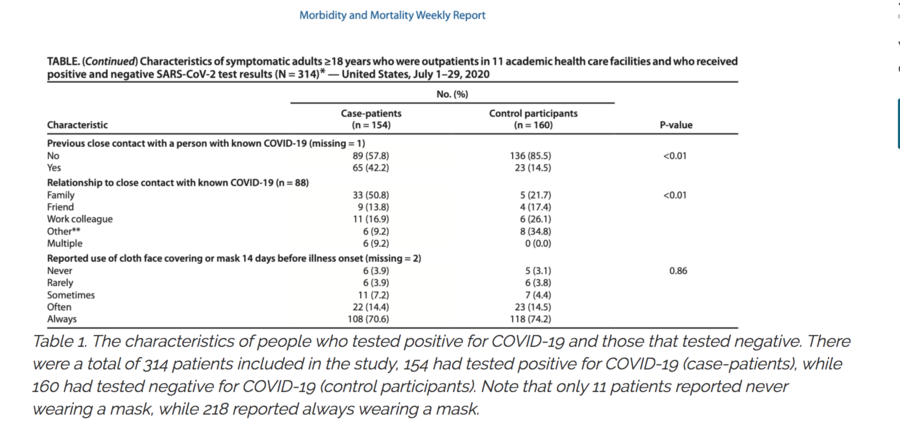
Is Maine's rise in COVID-19 cases linked to face mask use? No, that is misleading: A social media post showed a newspaper article claiming that the surge in coronavirus cases in Maine were the result of Gov. Janet Mills' mandate for citizens of the New England state to wear face masks. The claim uses statistics from a CDC published study that showed people who said they wore masks contracted COVID-19, but there was no evidence that the masks caused their infections. One of the authors of the study has said, "We are not aware of any of our data showing that wearing a mask increases the risk for COVID-19." The CDC has updated recommendations that state masks prevent the spread of COVID-19.
The claim appeared as a post (archived here), published on Facebook on December 5, 2020, under the title "Maine's Rise In COVID-19 Cases Linked To Face Masks." It opened:
The recent rise in COVID-19 cases in Maine could be linked to be prolonged use of facemasks by the general public.
This is what the post looked like on Facebook at the time of writing:
(Source: Facebook screenshot taken on Mon Dec 7 22:58:17 2020 UTC)
The article in the Facebook post was published by the Fort Fairfield Journal.
The Fort Fairfield Journal article cites a Centers for Disease Control and Prevention study published in the CDC's Morbidity and Mortality Weekly Report (MMWR) on September 11, 2020, titled, "Community and Close Contact Exposures Associated with COVID-19 Among Symptomatic Adults ≥18 Years in 11 Outpatient Health Care Facilities -- United States, July 2020."
Health Feedback, a non-partisan, non-profit organization science education group recruits experts to review science journalism and scientific journal articles. Health Feedback said previous social media and news reports using that study to make a case against face masks are flawed in their reasoning and are misleading.
From Health Feedback:
Flawed reasoning: The comparison made in the claim cannot evaluate mask effectiveness in reducing the spread of COVID-19, because the study that the claim is based on included many more people who wear masks than people who didn't. Of the 314 individuals surveyed in the study, only 11 never wore masks. Because the group sizes are so uneven, a comparison of the proportion of people who tested positive for COVID-19 who wore masks and who didn't would show mask wearers to be the majority.
There is no evidence that prolonged face-mask use increases risk of catching respiratory illness.
Below is the graphic the Fort Fairfield Journal article cited for the claim there was a "20 times greater chance of catching COVID-19 with prolonged wearing a face mask when compared to those who never wore a facemask." There is nothing in the study or in the graphic that shows there was a "greater chance of catching COVID-19." The people in the study who were positive (case-patients) reported that they wore masks for 14 days before the illness onset. There is nothing that states the masks gave them a greater chance of catching COVID-19.
Wesley Self, associate professor at Vanderbilt University School of Medicine and one of the authors on the CDC study, told Health Feedback, "We are not aware of any of our data showing that wearing a mask increases the risk for COVID-19."
According to its website, "The Fort Fairfield Journal is not a Bangor Daily News publication. The Fort Fairfield Journal is the only independently-owned newspaper in Northern Maine and is the only local newspaper in Aroostook County that is still being printed in Northern Maine."
The Fort Fairfield article, which refers to Maine's governor as Janet "Big Sister" Mills, claims:
The recent rise in COVID-19 cases in Maine could be linked to be prolonged use of facemasks by the general public. Scientific data collected in randomized controlled trials over the past 60 years has consistently shown that the use of facemasks to stop respiratory viruses is not only ineffective, facemasks may also cause an increase in respiratory illnesses such as influenza and COVID-19.
A more recent study conducted by the US CDCs COVID-19 response team and published in the CDC's Morbidity and Mortality Weekly Report showed that there is a 20 times greater chance of catching COVID-19 with prolonged wearing a face mask when compared to those who never wore a facemask. In that CDC study, it was found that of the 154 new cases of COVID-19, where patients had both a positive PCR test for the purported virus' RNA particle and real symptoms, around 85% reported they wore a facemask often, or always, up to 14 days prior to symptom onset. The control group in that study also showed symptoms of some sort of respiratory illness, but had a negative COVID-19 PCR test. In the control group, 88% of the people reported often or always wear a face mask. Around 4% of both groups reported never wearing a face mask prior to symptom onset."
The subhead of the article also claims, "The data shows prolonged face mask use increases risk of catching respiratory illness."
A video posted to the Fort Fairfield Journal YouTube page reports the same claims.
From the video:
The U.S. CDC revealed in May, 2020 that face masks do not stop the spread of respiratory viruses. A 2015 study in the British Medical Journal showed how cloth face masks actually increase the risk of catching a respiratory illness. In light of this data, the prolific use of cloth face masks in Maine, and the U.S., could explain the rising COVID-19 case numbers.
The article cites a May 2020 CDC article titled, "Nonpharmaceutical Measures for Pandemic Influenza in Nonhealthcare Settings--Personal Protective and Environmental Measures," that stated:
Disposable medical masks (also known as surgical masks) are loose-fitting devices that were designed to be worn by medical personnel to protect accidental contamination of patient wounds, and to protect the wearer against splashes or sprays of bodily fluids (36). There is limited evidence for their effectiveness in preventing influenza virus transmission either when worn by the infected person for source control or when worn by uninfected persons to reduce exposure. Our systematic review found no significant effect of face masks on transmission of laboratory-confirmed influenza."
However, The CDC updated its mask recommendation on November 20, 2020, to reduce transmission of COVID-19:
CDC recommends community use of masks, specifically non-valved multi-layer cloth masks, to prevent transmission of SARS-CoV-2. Masks are primarily intended to reduce the emission of virus-laden droplets ("source control"), which is especially relevant for asymptomatic or presymptomatic infected wearers who feel well and may be unaware of their infectiousness to others, and who are estimated to account for more than 50% of transmissions.1,2 Masks also help reduce inhalation of these droplets by the wearer ("filtration for personal protection"). The community benefit of masking for SARS-CoV-2 control is due to the combination of these effects; individual prevention benefit increases with increasing numbers of people using masks consistently and correctly."
















